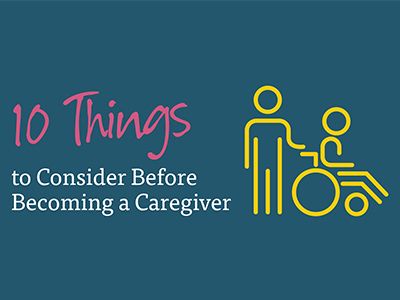When taking on caregiver responsibilities for an aging or sick parent, spouse, sibling or child, there are many big decisions you’ll have to make — from medical and financial issues to housing and legal concerns. Being able to maximize the quality time you have together means you may want to spend a bit more time in the beginning working to reduce stress and minimize expenses.
Becoming a caregiver is rarely an easy decision to make. The job can be overwhelming and very stressful at times, but it’s also an opportunity to spend more time with those you care about when they need you most. If you’re wondering how to take that first step in your journey as a primary caregiver, this five-step checklist may make things a little easier for you and your loved one.
Step 1: Start with an open, honest discussion.
At first, it can be tough to know what to do as a caregiver for a family member. Start by taking time to listen and to understand the person's wishes and needs, as well as concerns and fears — for both today and the future. Start the discussion by asking these questions:
- Do you want to stay in your own home or will you need assistance?
- If you're not able to make medical or financial decisions for yourself, is there someone you trust to make them on your behalf?
- What kind of level of daily care, ongoing medical treatment or end-of-life care do you want to receive?
- What fears, concerns or joys do you want to share?
- How you would like funeral arrangements or financial obligations handled when the time comes?
Step 2: Stay on top of medical issues.
When caring for a family member, you’ll be one of your loved one’s main advocates for ensuring he or she gets proper medical treatment. Talk with them about their medical condition and ongoing needs for care. Involve attending physicians, therapists or counselors if necessary. Additionally:
- Maintain a current, complete list of all medications (including dosages) and doctors, along with notes on medical history.
- Gain a solid understanding of his or her health insurance and what's covered by Medicare, Medicaid and/or Social Security disability benefits.
- Research both short- and long-term care options so that you are prepared no matter what happens. There are many programs that include nursing, social work and occupational and physical therapy —both offsite and in-home.
- Ensure all medications are accessible and clearly marked for your loved one to access.
Step 3: Figure out your loved one’s finances.
A frank discussion about money is usually not fun, but it’s critical to ensuring the means are available to pay for the necessary housing, medications and other living expenses your loved one will incur. These steps will help you put a financial strategy in place:
- Make a list of all bank account numbers, financial institutions, retirement accounts, mortgage information, car loans, credit card debt, etc.
- Assess all income and monthly expenses to make sure that necessary payments can be made.
- Know how bills are paid (online, recurring payment, by mail).
ARAG’s Personal Information Organizer allows you to put all of your vital details in one document, so you and your loved ones can locate it when you really need it.
Step 4: Make sure the appropriate legal documents are in place.
Having the appropriate — and current — legal documents in order will help you know your loved one’s wishes ahead of time, and guide you through difficult decisions if something were to happen to them. The following are essential legal documents to have in place:
- Health care power of attorney: This is a document that designates someone to make medical decisions on behalf of the patient. This decision-making power is limited to when the patient is unable to make decisions on his or her own.
- HIPAA representative: The Health Insurance Portability and Accountability Act (HIPAA) is a federal law that helps protect the privacy of patients. Doctors, hospitals and insurance companies are required to follow HIPAA rules. This means they can only share medical information with the patient or the patient's personal representative, as dictated by this document.
- Living will: Also known as an advance directive, this document details a patient's wishes regarding end-of-life care. This document goes into effect in terminal situations when a patient is in an end-of-life situation or permanently unconscious, and incapable of making his or her own decisions.
- Durable power of attorney: This document names someone to manage the patient's affairs beyond just medical care, allowing access to financial accounts and giving the person decision-making authority.
- Last will and testament: This outlines final directions for who will receive a person's assets, real estate and personal property when he or she dies. The will also identifies a person (executor) to carry out these orders and a person (guardian) to care for any children under the age of 18.
Step 5: Talk about options for living arrangements.
When choosing the best living arrangement for your loved one — whether it's remaining in their own home, moving in with you, downsizing, or choosing an assisted living or residential care facility —consider:
- Your loved one's personal comfort and preferences.
- Financial resources and limitations.
- Health concerns and needs that will require ongoing medical services and insurance payments.
- Availability of community and support services.
Finally, as you consider your role as a caregiver, know that responsibilities and duties vary by situation. There’s no right or wrong answer to the question, “What do caregivers do?” Also, don’t hesitate to seek caregiver resources and support for yourself when you need it. Caregiving on your own is a tough task, but enlisting a team of people helps lighten the burden over the long haul.
A legal plan can help.
Being a caregiver can be very rewarding. But it can also come with some legal issues you’ll need to address. A legal insurance plan from ARAG offers you a place to turn, where you’ll have access to a network of attorneys who can guide you through making important decisions.



